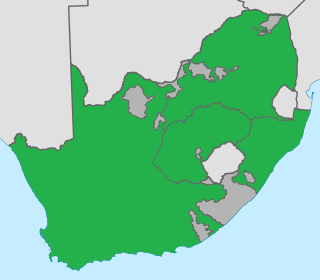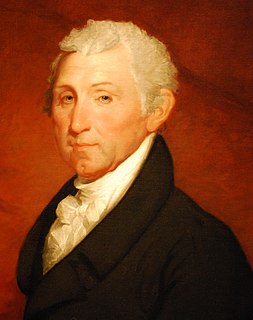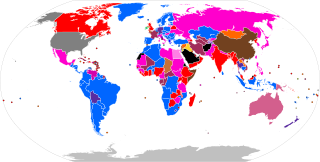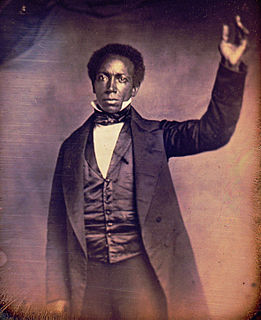A constitutional amendment is a modification of the constitution of a polity, organization or other type of entity. Amendments are often interwoven into the relevant sections of an existing constitution, directly altering the text. Conversely, they can be appended to the constitution as supplemental additions (codicils), thus changing the frame of government without altering the existing text of the document.

The President of the Co-operative Republic of Guyana is the head of state and the head of government of Guyana, as well as the commander-in-chief of the armed forces of the Republic, according to the Constitution of Guyana. The President is also the Chancellor of the Orders of Guyana.
A supermajority or supra-majority or a qualified majority, is a requirement for a proposal to gain a specified level of support which is greater than the threshold of more than one-half used for majority.
A double majority is a voting system which requires a majority of votes according to two separate criteria. The mechanism is usually used to require strong support for any measure considered to be of great importance. Typically in legislative bodies, a double majority requirement exists in the form of a quorum being necessary for legislation to be passed.
In the politics of the United States, the process of initiatives and referendums allow citizens of many U.S. states to place new legislation on a popular ballot, or to place legislation that has recently been passed by a legislature on a ballot for a popular vote. Initiatives and referendums, along with recall elections and popular primary elections, are signature reforms of the Progressive Era; they are written into several state constitutions, particularly in the West.

Belarus elects on national level a head of state - the president - and a legislature. The president is elected for a five-year term by the people. The National Assembly has two chambers. The House of Representatives has 110 members elected in single-seat constituencies elected for a four-year term. The Council of the Republic has 64 members, 56 members indirectly elected and eight members appointed by the president.

The Electoral Commission was a temporary body created on January 29, 1877 by the United States Congress to resolve the disputed United States presidential election of 1876. Democrat Samuel J. Tilden and Republican Rutherford B. Hayes were the main contenders in the election. Tilden won 184 electoral votes—one vote shy of the 185 needed to win—to Hayes's 165, with 20 electoral votes from four states unresolved. Both Tilden and Hayes electors submitted votes from these states; and each claimed victory over the other.

An Ontario electoral reform referendum was held on October 10, 2007, on the question of whether to establish a mixed member proportional representation (MMP) system for elections to the Legislative Assembly of Ontario. However, the resulting vote was strongly in favour of the existing plurality voting or "first-past-the-post" (FPTP) system.

An independence referendum was held in Montenegro on 21 May 2006. It was approved by 55.5% of voters, narrowly passing the 55% threshold. By 23 May, preliminary referendum results were recognized by all five permanent members of the United Nations Security Council, suggesting widespread international recognition if Montenegro were to become formally independent. On 31 May, the referendum commission officially confirmed the results of the referendum, verifying that 55.5% of the population of Montenegrin voters had voted in favor of independence. Because voters met the controversial threshold requirement of 55% approval set by the European Union, the referendum was incorporated into a declaration of independence during a special parliamentary session on 31 May. The Assembly of the Republic of Montenegro made a formal Declaration of Independence on Saturday 3 June.

A referendum on a new constitution was held in South Africa on 2 November 1983 in which the white population was given the opportunity to approve or reject the Constitution of 1983. This constitution introduced the Tricameral Parliament, in which coloured and Indian South Africans would be represented in separate parliamentary chambers, while black South Africans would remain unrepresented. The referendum passed with 66.3% of voters voting "Yes"; consequently the new constitution came into force on 3 September 1984.

Referendums in Taiwan at both the national and local level are governed by the Referendum Act of Taiwan, which was enacted by the Legislative Yuan in December 2003. Citizens can propose laws via referendums at the national and local levels. The Referendum Act also allowed people to make changes or abolish laws by referendums.

This article describes the United States presidential election, 1820, in Missouri. In this first year, the state's electors were pledged to the eventual winner, James Monroe, by the state legislature. It was the first year Missouri cast ballots for the electoral college.

An electoral system is a set of rules that determine how elections and referendums are conducted and how their results are determined. Political electoral systems are organized by governments, while non-political elections may take place in business, non-profit organisations and informal organisations.

A referendum to amend the Constitution of Liberia was held on 23 August 2011. Voters chose whether to ratify four amendments regarding judge tenure, elections scheduling, presidential candidate requirements and the electoral system. The National Elections Commission of Liberia (NEC) oversaw the referendum.
A nine-part referendum was held in Switzerland on 14 January 1866. Only two proposals received a majority of votes in favour, and only one had both a majority of votes and majority of cantons.
Five referendums were held in Switzerland during 1920. The first three were held on 21 March on a federal law on regulating employment contracts, a ban on creating gambling establishments and a counterproposal to the ban. The fourth was held on 16 May on membership the League of Nations, whilst the fifth was held on 31 October on a federal law on working times on railways and other transport services. Of the five, only the ban on gambling establishments, League of Nations membership and the law on working times were passed.

A constitutional referendum was held in Liechtenstein on 1 July 2012 concerning limiting the extensive veto powers held by the Prince of Liechtenstein. The proposals were rejected by 76% of voters.

A referendum on the length of terms of office was held in Liberia on 4 May 1869. The proposals put forward by Parliament on 29 January 1869 would increase the presidential term from two to four years, increase the term of House of Representatives members from two to four years, and increase the term of office of Senators from four to eight years. President-elect Edward James Roye claimed that the changes were approved and that he would remain in office until 1873. However, the legislature, which oversaw the counting process, declared the proposals to be rejected.

The European Union Referendum Act 2015(c. 36) is an Act of the Parliament of the United Kingdom that made legal provision for a pre-legislative referendum to be held in the United Kingdom and Gibraltar, on whether it should remain a member state of the European Union or leave it. The bill was introduced to the House of Commons by Philip Hammond, Foreign Secretary on 28 May 2015. Two weeks later, the second reading of the Act was supported by MPs from all parties except the SNP; the Act subsequently passed on its third reading in the Commons on 7 September 2015 and was approved by the House of Lords on 14 December 2015, and given Royal Assent on 17 December 2015 and came partly into force on the same day and came into full legal force on 1 February 2016.

Maine Question 1 was a people's veto referendum that appeared on the June 12, 2018 statewide ballot. It sought to reject a law passed by the Maine Legislature that suspended the implementation of ranked choice voting, authorized by Maine voters in a previous referendum, for use in Maine elections until and if an amendment to the Maine Constitution is passed to expressly permit it; failing that, the law would be automatically repealed in 2021. It qualified because supporters of the original referendum collected the necessary number of signatures from registered Maine voters. This vote coincided with primary elections in which party nominees for governor, U.S. Senate, U.S. House, and the Maine Legislature were chosen to run in general elections on November 6.















